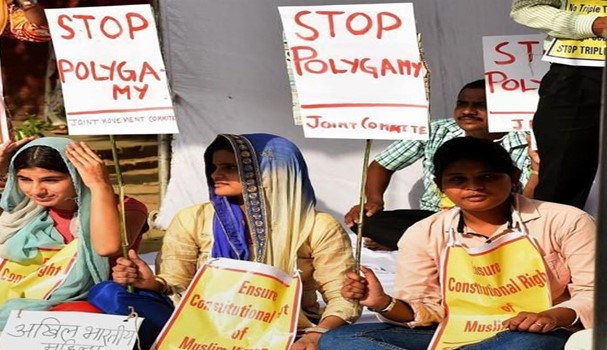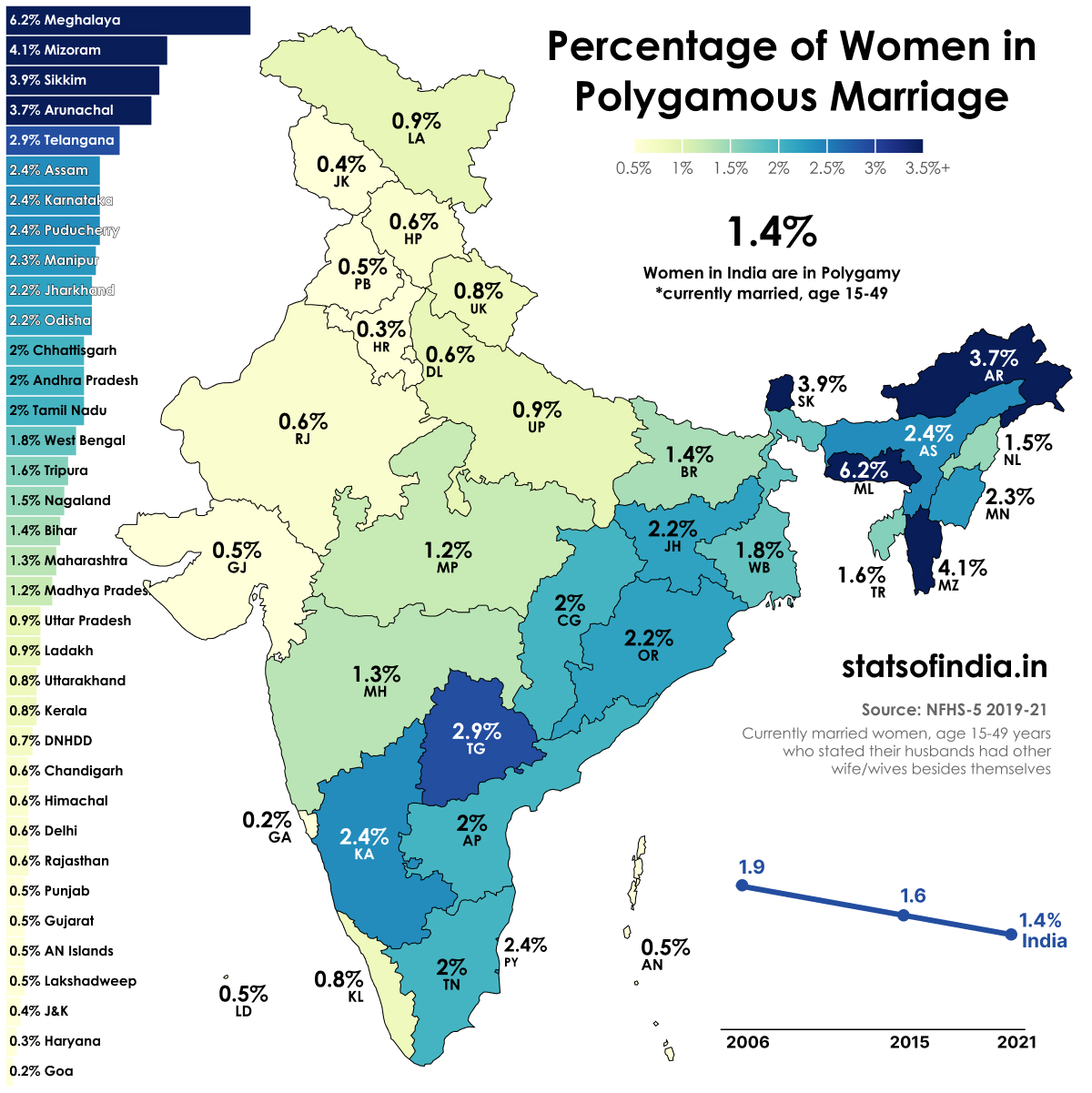- Courses
- GS Full Course 1 Year
- GS Full Course 2 Year
- GS Full Course 3 Year
- GS Full Course Till Selection
- Answer Alpha: Mains 2025 Mentorship
- MEP (Mains Enrichment Programme) Data, Facts
- Essay Target – 150+ Marks
- Online Program
- GS Recorded Course
- Polity
- Geography
- Economy
- Ancient, Medieval and Art & Culture AMAC
- Modern India, Post Independence & World History
- Environment
- Governance
- Science & Technology
- International Relations and Internal Security
- Disaster Management
- Ethics
- NCERT Current Affairs
- Indian Society and Social Issue
- NCERT- Science and Technology
- NCERT - Geography
- NCERT - Ancient History
- NCERT- World History
- NCERT Modern History
- CSAT
- 5 LAYERED ARJUNA Mentorship
- Public Administration Optional
- ABOUT US
- OUR TOPPERS
- TEST SERIES
- FREE STUDY MATERIAL
- VIDEOS
- CONTACT US
POLYGAMY IN INDIA
POLYGAMY IN INDIA


Latest Context
Assam's Chief Minister has said that the state will take "Legislative Action" to ban the practice of polygamy and that an "Expert committee" will be established to examine the issue.
Facts about Polygamy
- Polygamy is derived from the terms "poly," which means "many," and "gamos," which means "marriage." Therefore, polygamy refers to several marriages.
- Therefore, polygamy is a marriage where one partner, of any sex, may have multiple partners at once.
- Polygamy, or the condition when a man has more than one wife, was traditionally prevalent in India. The practise was forbidden by the Hindu Marriage Act of 1955.
- The Special Marriage Act (SMA), which was passed in 1954, permit inter-religious marriages but ban polygamy. Many Muslim women have used the Act to stop engaging in polygamy.
- Types of Polygamy:
- Polygyny: t is the marriage arrangement in which a man has numerous wives. This type of polygamy is more prevalent or common. The Indus Valley Civilization had the belief that monarchs and emperors had several wives.
- Polyandry: It is a type of marriage in which a woman has a number of husbands. Nevertheless, it's possible that this won't happen very often.
- Bigamy: If a person is already married and the marriage is still legally binding, then being married to someone else is known as bigamy, and the bigamist is the one who does it. It is considered a criminal offense in many countries, including India.
- Prevalence in India:
- According to the National Family Health Survey-5 (2019–20), polygamy was more common among Christians (2.1%), Muslims (1.9%), Hindus (1.3%), and other religious groups (1.6%).
- The data showed that the Northeastern states with tribal populations had the highest rate of polygynous marriages.
- High tribal population areas made up the majority of the list of the 40 districts with the highest incidence of polygyny.

Various Religious Laws Pertaining to Marriage in India
- Hindus:
- It was made clear that Hindu polygamy would be abolished and criminalised by the Hindu Marriage Act, which came into force in 1955.
- Monogamous relationships are cautiously required by the Act under Section 11 of the Act, which declares polygamous marriages invalid.
- Section 17 of the same Act as well as Sections 494 and 495 of the Indian Penal Code, 1860, are used to penalise those who commit it.
- The provisions of the Hindu Marriage Act also apply to Buddhists, Jains, and Sikhs as they are all regarded as Hindus and do not have their own laws.
- Parsi:
- Bigamy was already prohibited by the 1936 Parsi Marriage and Divorce Act.
- Any Parsi who has ever been married is subject to the penalties outlined in the India Penal Code for the crime of getting married again while still a Parsi, whether they have received a legal divorce from their spouse or had their previous marriage declared invalid or dissolved.
- Muslims:
- Muslims in India must abide by the provisions of the "Muslim Personal Law Application Act (Shariat) of 1937," as interpreted by the All-India Muslim Personal Law Board.
- Islam recognises polygamy as a religious practise; hence it is not illegal under Muslim law. As a result, Muslims tend to uphold and engage in polygamy.
- It is however obvious that this method can be overturned if it is out to be in violation of the fundamental rights of the constitution.
- A special law surpasses the general law according to the legal concept, therefore when the Indian Penal Code and personal laws conflict, the personal laws take priority.
Judicial Perspectives Related to Polygamy
- Parayankandiyal v. K. Devi & Others (1996): The Supreme Court (SC) came to the conclusion that Hindu culture, which rejected and condemned a second marriage, valued monogamous partnerships as the norm and philosophy. Due to the impact of religion, Hindu culture was not permitted to adopt polygamy.
- State of Bombay v. Narasu Appa Mali (1951): The Bombay (Prevention of Hindu Bigamy Marriage) Act, 1946 was upheld by the Bombay High Court as not being discriminatory.
The Supreme Court declared that a state legislature has the power to pass laws for the benefit of the populace and reforms, even if they go against Hindu tradition or religion.
- Javed & Others v. State of Haryana & Others (2003): The SC determined that social harmony, dignity, and wellbeing are conditions for freedom under Article 25. The marriage of four women is permitted by Muslim law, although it is not required. Not marrying four women will not be a violation of religious tradition.
Impact of Polygamy on Indian Society and the Constitutional Provisions
- Polygamy has a large influence on Indian society, and there has been discussion on whether it is constitutionally permissible in light of certain religions, such Islam and Hinduism.
- India is a secular state where the laws regard all religions equally and no one faith is seen as superior to another.
- All citizens in India are given fundamental rights under the Indian Constitution, and any act that violates those rights is ruled unconstitutional.
- Any measure that violates Part III of the Constitution is void, according to Article 13 of the Constitution.
- The Supreme Court noted in R.C. Cooper v. Union of India (1970) that the theoretical position that the component and construct of state intervention determine the severity of the safeguard that an underprivileged group may assert is incompatible with the constitutional provision, which seeks to give the average citizen the broadest possible protections of his fundamental rights.
- Every person living on Indian territory is guaranteed equal treatment and legal protection under Article 14 of the Constitution.
- According to Article 15(1) of the Constitution, the state is not allowed to discriminate against any person based on their religion, race, gender, or place of birth.
Which Countries allow Polygamy?
- In countries like India, Singapore, and Malaysia, polygamy is only acceptable and legal for Muslims.
- In several countries, like Algeria, Egypt, and Cameroon, polygamy is still recognised and practised. The only places in the entire globe where polygamy is still permitted are these.
Conclusion
- It is true that polygamy has long existed in Indian civilization, and although it is currently forbidden, some regions still permit it.
- Polygamy is a practise that is not exclusive to any one religion or culture, and it has historically been justified for a number of reasons.
- But because of how society has changed, polygamy should no longer be practised because its arguments are outdated.

Prelims
Q. Which Article of the Constitution of India safeguards one’s right to marry the person of one’s choice? (2019)
(a) Article 19
(b) Article 21
(c) Article 25
(d) Article 29
Ans: (b)
Exp:
The right to marry is a component of the right to life under Article 21 of the Constitution of India which states that “No person shall be deprived of his life and personal liberty except according to the procedure established by law”.
In Lata Singh v. State of Uttar Pradesh 2006, the Supreme Court viewed the right to marry as a component of the right to life under Article 21 of Indian Constitution.
Therefore, option (b) is the correct answer.
Mains
Q. Customs and traditions suppress reason leading to obscurantism. Do you agree? (2020)



